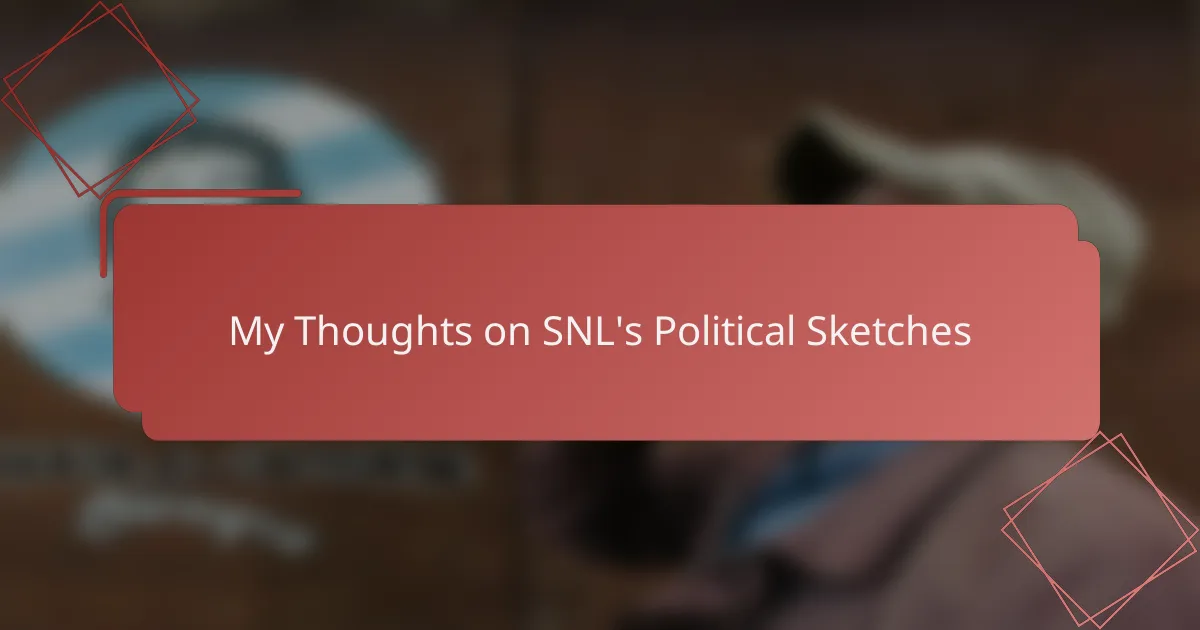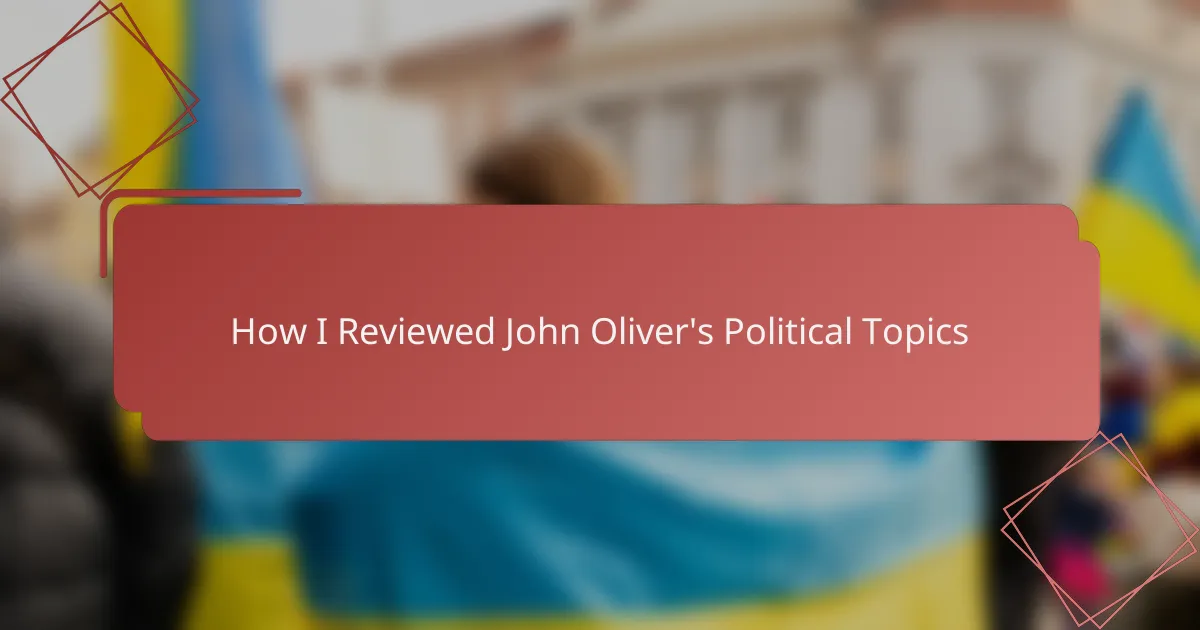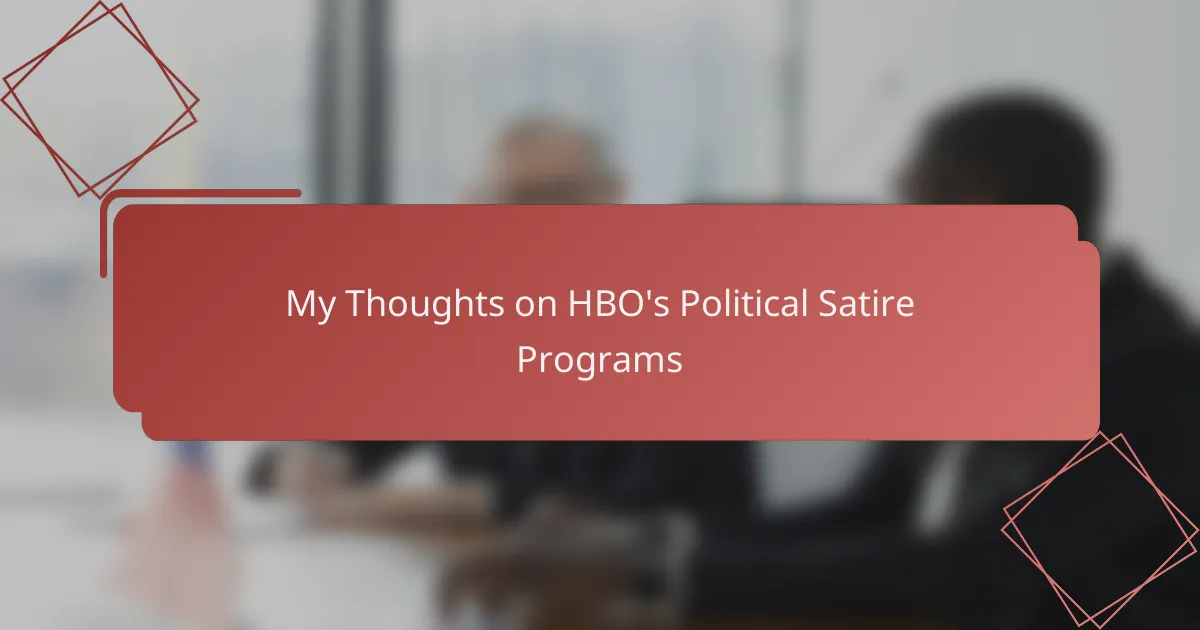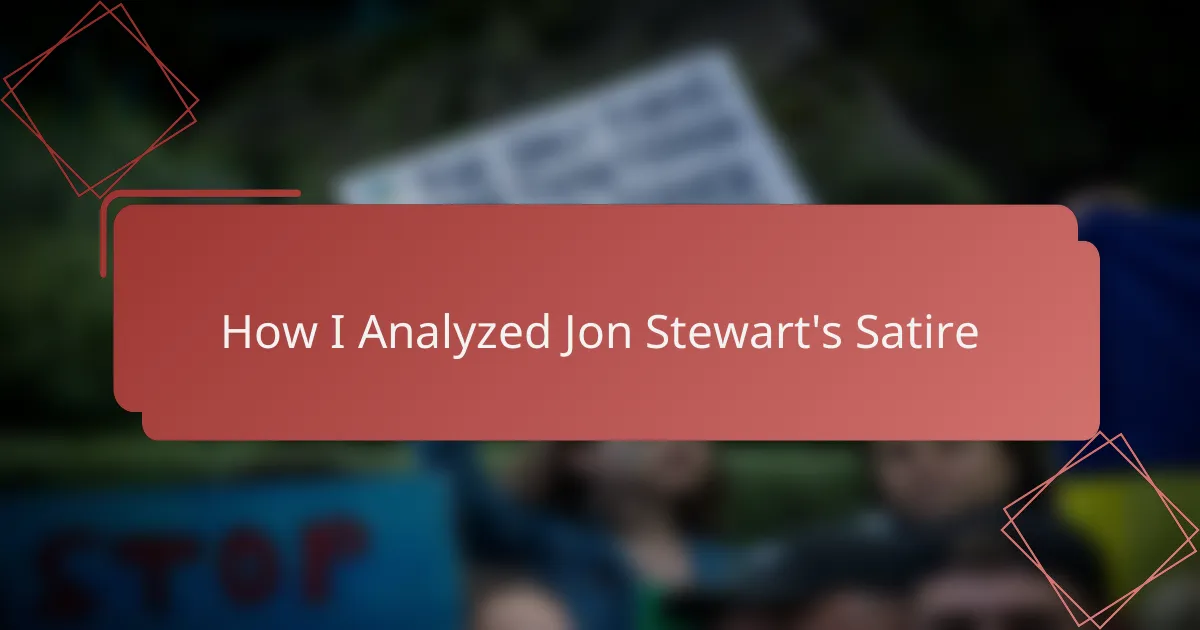Key takeaways
- Political satire combines humor and critical commentary, making complex political topics accessible and encouraging public engagement.
- SNL utilizes caricature, irony, and exaggeration to effectively highlight political absurdities and contradictions.
- The show significantly shapes public perception of political figures, often reinforcing stereotypes or prompting critical discussions within society.
- SNL’s sketches connect with audiences emotionally, tapping into real frustrations and anxieties related to current political events.
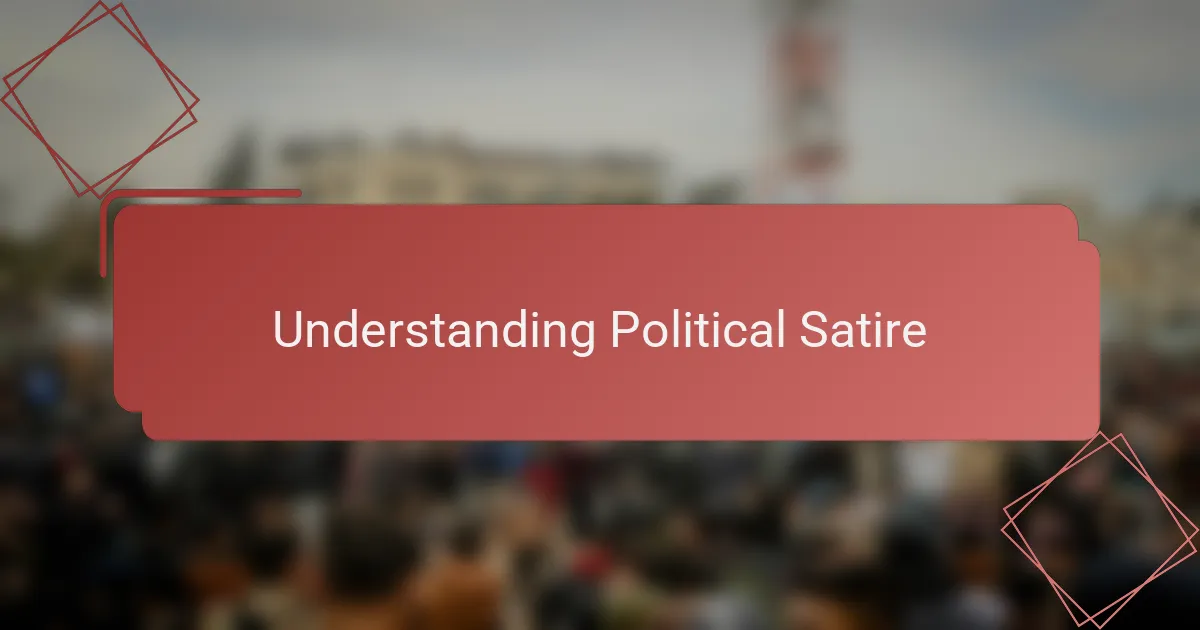
Understanding Political Satire
Political satire, to me, is more than just humor—it’s a powerful lens through which we can examine society and leadership. When I watch SNL’s political sketches, I often find myself laughing but also reflecting on the deeper truths they reveal about politicians and current events. This form of satire cleverly blends comedy with criticism, making complex political issues more accessible and thought-provoking.
From my experience, political satire works best when it balances sharp wit with empathy, avoiding cynicism while still holding public figures accountable. It’s not just about mocking leaders; it’s about encouraging audiences to question power and engage in the democratic process. Here are some key features I’ve noticed in effective political satire:
- Uses exaggeration and irony to highlight absurdities in politics
- Employs humor to break down complex political topics
- Encourages critical thinking and public discourse
- Creates emotional connections by showing the human side of political figures
- Balances humor with respectful critique to maintain credibility
- Reflects cultural and societal values through timely commentary
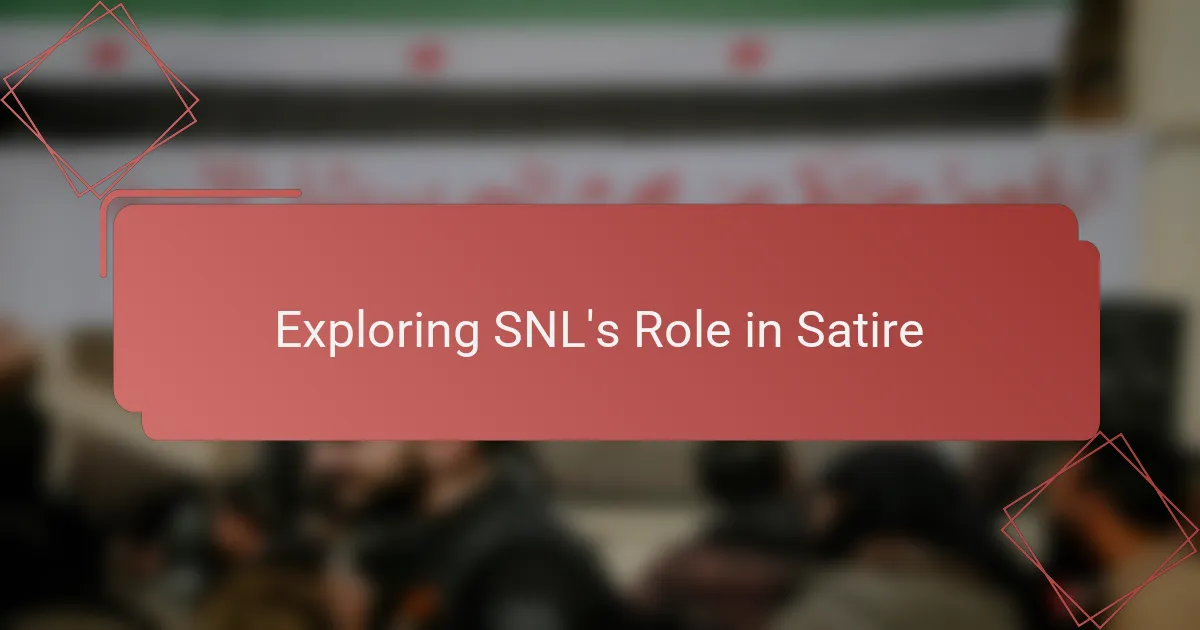
Exploring SNL’s Role in Satire
SNL has always held a unique place in the realm of political satire, acting as a mirror to society’s most pressing issues while using humor to ease the sting of criticism. From my experience watching the show over the years, it’s clear that SNL’s sketches often shape public perception by blending sharp wit with timely commentary. I remember the way their election week sketches heightened my awareness of political absurdities, making me laugh but also think critically.
What stands out to me is how SNL uses satire not just to entertain but to provoke reflection. Their ability to distill complex political scenarios into digestible, comedic moments is no small feat. The show’s impact extends beyond the TV screen, often sparking conversations at dinner tables and offices alike.
Here are some ways I see SNL’s role in satire:
- Highlights contradictions in political rhetoric through humor
- Uses caricature to make politicians more relatable or scrutinize their actions
- Encourages public engagement by making politics accessible and less intimidating
- Provides a historical snapshot of political climates through recurring characters and sketches
- Acts as a platform for emerging comedic voices to influence political discourse
These points reflect why I think SNL remains a cornerstone of political satire that connects with viewers on multiple levels.

Common Themes in SNL Sketches
One pattern I consistently notice in SNL’s political sketches is their reliance on caricature—exaggerating a politician’s traits until they become almost cartoonish. This technique does more than just entertain; it makes complex political figures easier to understand and questions their motives in a way that feels immediate and relatable. Have you ever found yourself laughing at a sketch and then realizing you actually learned something new about the person being portrayed?
Another theme that strikes me is the use of irony and contradiction to expose political double-speak. SNL loves to spotlight the gap between what politicians say and what they actually do, which often reveals uncomfortable truths beneath the humor. This sharp contrast not only provokes laughter but also invites viewers to think critically about the messages they receive from public officials.
Finally, I see that many sketches tap into current cultural anxieties—whether it’s election chaos, policy debates, or scandals—making the satire feel urgent and relevant. This connection to the moment keeps the sketches fresh and gives them a certain emotional weight. It’s like the show is saying, “Here’s what we’re all thinking but might be too afraid or busy to say out loud.” That sense of shared understanding makes the humor hit a little closer to home for me.
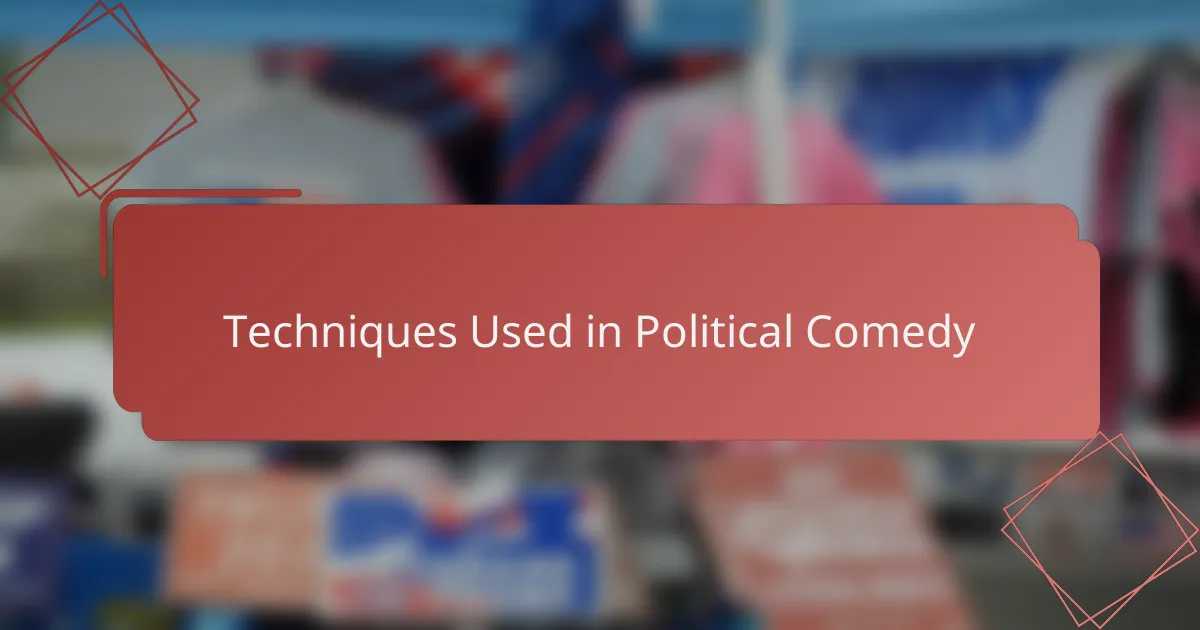
Techniques Used in Political Comedy
Political comedy on SNL often relies on exaggeration and impersonation to make a point that sticks. From my experience watching their sketches, the way they amplify politicians’ traits—sometimes to absurd levels—hits a nerve because it exposes flaws we sense but don’t always articulate. It’s like holding up a funhouse mirror that distorts reality just enough to make you laugh and think at the same time.
Another technique that stands out to me is the use of irony and juxtaposition. Seeing a politician act in ways that contradict their usual public persona creates this sharp contrast that’s both funny and revealing. The humor digs beneath the surface, turning familiar stories into fresh, unpredictable insights.
- Exaggeration of mannerisms and speech patterns
- Impersonation with detailed costume and voice mimicry
- Irony to expose contradictions in political behavior
- Juxtaposition of events or statements to highlight hypocrisy
- Satirical rewriting of actual political speeches or debates
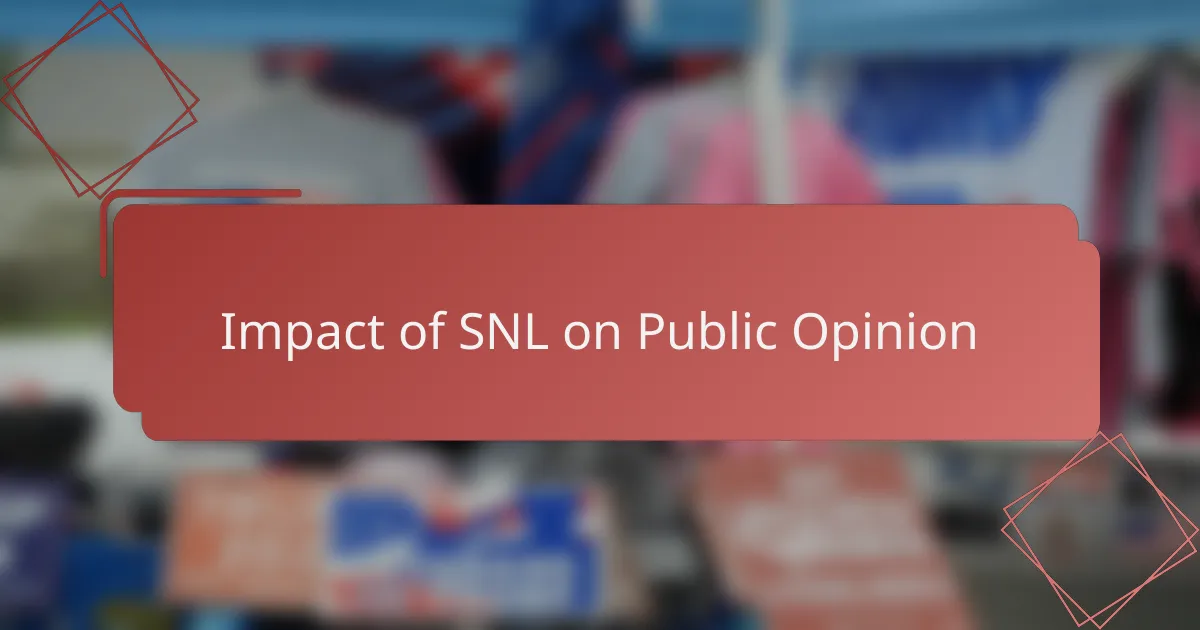
Impact of SNL on Public Opinion
The impact of SNL on public opinion is undeniable. From my experience watching for years, their sketches often shape how people perceive political figures, sometimes reinforcing stereotypes or opening viewers’ eyes to overlooked issues. I’ve noticed friends change their views after a particularly sharp or humorous sketch, which shows the power of satire in everyday conversations.
| Aspect | Impact of SNL on Public Opinion |
|---|---|
| Reach | Millions of viewers each week, influencing a wide audience |
| Perception Shaping | Creates memorable impressions of political figures through humor |
| Engagement | Encourages political discussion among diverse groups |
| Bias Reinforcement | Sometimes solidifies pre-existing opinions rather than changing minds |
| Emotional Connection | Uses comedy to make politics more relatable and less intimidating |
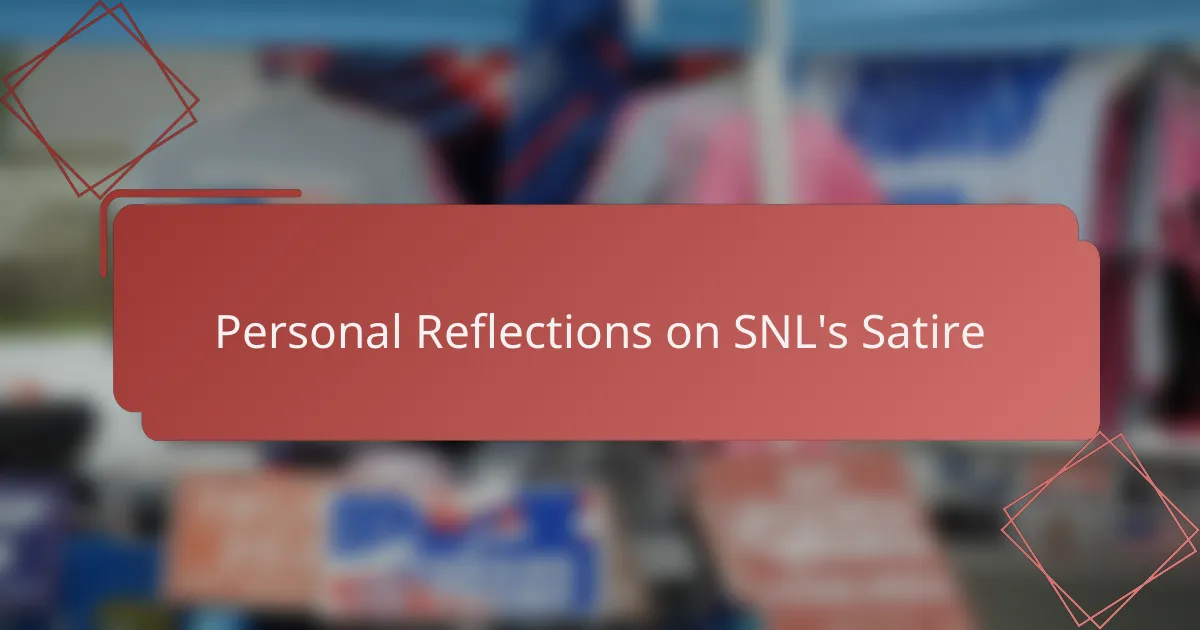
Personal Reflections on SNL’s Satire
I’ve always found SNL’s political sketches to be a fascinating blend of humor and insight. They don’t just make me laugh; they often make me think critically about the political landscape. One sketch that stuck with me was their portrayal of election night tensions—I could really feel the underlying anxiety beneath the comedy.
| Aspect | My Perspective |
|---|---|
| Accuracy | Usually sharp, capturing politician quirks well, though sometimes exaggerated for comedic effect |
| Emotional Impact | High—sketches resonate because they tap into real frustrations and hopes I’ve felt during political events |
| Balance | Leans satirical rather than neutral, which I appreciate for its boldness, but it can feel one-sided |

Lessons Learned from SNL Sketches
I’ve noticed that SNL’s political sketches often teach us more than just humor; they reveal how deeply satire can influence public perception. From my point of view, these sketches force viewers to critically analyze political figures and their actions, making complicated issues accessible. Personally, I’ve found that laughing at exaggerations helps me digest serious topics without feeling overwhelmed.
| Lesson | Insight |
|---|---|
| Exaggeration as a Tool | Amplifies traits to highlight flaws or virtues, making political commentary memorable. |
| Relatability | Connects with viewers by portraying politicians in everyday or absurd scenarios. |
| Influence on Public Opinion | Shapes perceptions by blending humor with critique, often impacting how people view leadership. |
